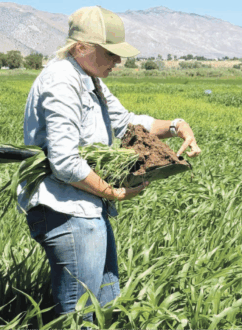When outsiders think of Nevada, they picture the garish lights of Las Vegas, the blue depths of Lake Tahoe or perhaps red desert sands.
But Nevada has a green side, too, in the form of small farms and ranches and a growing urban agriculture sector. Helping those producers thrive, University of Nevada, Reno Extension, with funding support from Western SARE, has developed a number of workshops and conferences focused on growing Nevada agriculture utilizing climate-smart practices.
“This has been one of the most popular projects we’ve had in a while,” said Staci Emm, an Extension professor. “We’re getting a large turnout in our urban ag and small ag events and averaging 50 to 60 people at each in-person per workshop. We have workshops for our large ag producers as well, primarily geared toward our large ranching population.”
The topics of the workshops vary, naturally, to reflect the needs and interests of the audiences, although improving soil health is a priority for all the groups.
For the large ranch audience, soil health was the focus of a workshop at a Smith Valley ranch with a successful vermiculture program, which uses worms to help create compost which can be spread as a solid or brewed into a liquid “worm tea” that is applied onto fields.
“It’s likely one of the top vermiculture programs in the West,” Emm said. “Our goal is to leverage this opportunity and invite other ranchers to witness the various fields showcasing the areas where they’ve utilized worm tea to enhance their efforts in improving soil health. We aim to highlight the innovative practices involved in producing a product like ‘worm tea’ and demonstrate its effects on crop production and soil health across different environments with different management practices.”
Building a worm bin was also a topic of a workshop at the Nevada Small Farms Workshop at the end of February in Reno, along with these other half-day topics: meat and poultry processing, soil health 101, and value-added and export opportunities. A full-day pre-conference workshop was devoted to marketing.
“The small ag audience are individuals who typically have two to 10 acres,” Emm said. “They may have jobs off the farm, too, but they’re interested in marketing and the business side of farming and improving their economic opportunities and bottom line.”
The urban ag audience is bit different. Concentrated in Clark and Washoe counties – home to Las Vegas and Reno, the state’s population centers – this audience brings a different background to these Extension events.
“The education level of the individuals at our urban ag workshop took us by surprise that first year,” Emm said. “We had so many people there who said, ‘I’ve done my career as a scientist, or as a doctor, a lawyer, an engineer, and now I want to do this.”
Their goals are also different than many other ag producers.
“I’m finding it’s not an audience that is always focused on economics,” Emm said. “I’d say maybe 60% aren’t attending looking for financial benefits or making more money. Their interests are more around health and wellness, food sovereignty or self-sustainability, and for protecting the environment.”
The audience is also growing, with 125 attending the 2024 conference and 200 expected at the 2025 event.
“It’s a great program,” Emm said. “We have enough funding to carry it through 2025 and then our team will seek another Western SARE grant because we need to continue these education efforts. And it’s such a great alignment with SARE’s mission and vision.”
This story was featured in the spring 2025 edition of Western SARE's bi-annual magazine Simply Sustainable. Download the entire edition here.
View Related SARE Grant:
- Nevada Climate-Smart Agriculture Educational Program (WRGR23-005)
